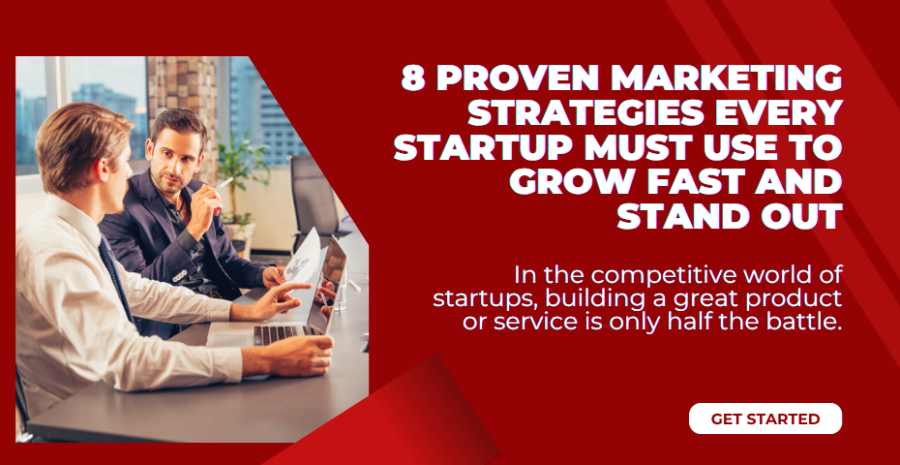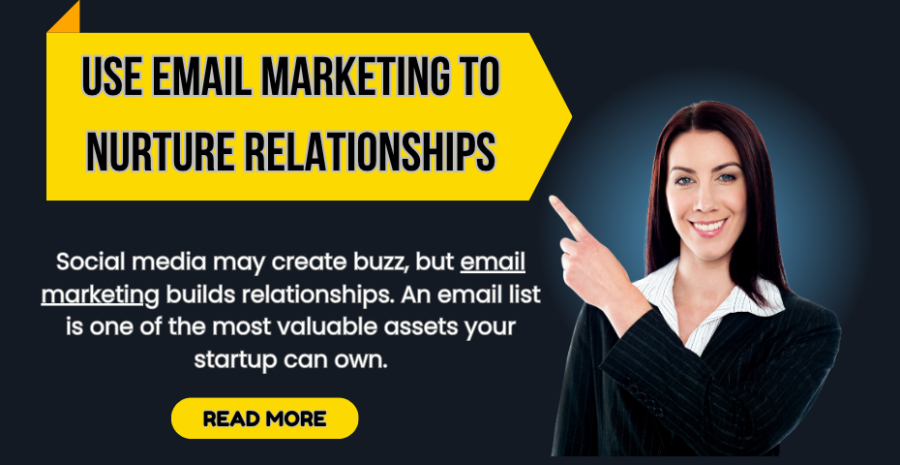
8 Proven Marketing Strategies Every Startup Must Use to Grow Fast and Stand Out

In the competitive world of startups, building a great product or service is only half the battle. The real challenge lies in getting it into the hands — and minds — of the right people.
Startups don’t have the luxury of massive marketing budgets, brand awareness, or expansive teams. They operate in survival mode, where every dollar counts, and every message must hit its mark. That’s why mastering smart, strategic, and cost-effective marketing approaches is critical for early-stage success.
The right marketing strategies don’t just attract customers — they build loyal tribes, generate buzz, and validate your startup’s place in the market. Many founders mistakenly believe they need to "go big" right out of the gate. But in reality, going smart, targeted, and consistent is what creates traction.
Marketing in the early stages is not about vanity metrics like likes or views. It’s about learning how to connect your message with the right people at the right time, in the right way. Your startup’s success will not depend solely on having the best product, but on how well you communicate its value, solve real problems, and make people feel like your solution was made just for them.
And in the early days, your marketing also serves as your research lab. It's where you gather feedback, test offers, and refine your voice. Without strong marketing, even the most revolutionary ideas go unnoticed. With the right strategy, even a small, underfunded startup can outmaneuver well-funded competitors.
These marketing strategies are not theoretical fluff or generic advice. They are grounded in what works in today’s digital ecosystem — methods that have helped countless startups generate their first 1,000 users, build brand trust, and establish authority without blowing through capital.
Whether you’re a solopreneur bootstrapping your dream, or a small team preparing for scale, your marketing must be efficient, authentic, and adaptive. These eight marketing strategies are designed to help you maximize impact, minimize waste, and grow with intention.
The sooner you start applying them, the sooner your startup becomes not just another idea — but a force in the marketplace.
Let’s dive into the proven paths to startup growth.

Startups often fail by trying to appeal to everyone and ending up resonating with no one. The first marketing law for any startup is: niche down.
Get crystal clear on exactly who your ideal customer is — their needs, frustrations, desires, and the language they use to express them. This allows you to craft messaging that cuts through the noise and speaks directly to the people who are most likely to buy, refer, and rave about your product.
Forget the broad market — win the micro-market. Focus on solving one big problem for one specific audience better than anyone else.
When you know your niche deeply, you don’t just sell — you serve, and your message becomes magnetic. Before pouring money into ads or scaling your outreach, ensure your niche is so well-defined that your marketing feels like a one-on-one conversation.
That clarity is your secret weapon in an overcrowded world.

Your brand is more than a logo or color palette — it’s the personality and promise of your startup. In a crowded digital landscape, brand clarity creates memorability.
From your tone of voice, to your visuals, to how you tell your story — everything must align to create a cohesive and compelling identity. Startups that invest early in building a distinct brand stand out, even if their budgets are small.
Branding builds trust, and trust turns browsers into buyers. Your brand should communicate your mission, values, and the emotional journey you take your customers on. Make sure it’s consistent across every touchpoint — your website, emails, social posts, and product experience.
People don’t just buy what you sell; they buy why you sell it. A startup with a clear brand identity is remembered long after a better-funded but forgettable competitor fades into the noise.

Content marketing is a startup’s most powerful tool for long-term growth. Instead of interrupting your audience with ads, content attracts them by providing value — through blog posts, videos, guides, or social media posts that educate, entertain, or inspire.
Great content builds authority and earns trust, positioning your startup as a helpful expert in your field. It also improves your SEO, making it easier for people to find you when they search for solutions online.
Start small but consistent — one helpful post a week is better than a flood of fluff. Focus on solving problems, answering common questions, and showcasing your unique perspective.
Over time, content compounds. Your posts become lead magnets, your videos become evergreen assets, and your brand becomes a go-to resource.
In a world where attention is currency, content marketing is how you earn it authentically.

Social media may create buzz, but email marketing builds relationships. An email list is one of the most valuable assets your startup can own.
It gives you direct access to people who have already expressed interest in your mission.
Use your email list to share valuable content, launch updates, behind-the-scenes stories, and offers tailored to your audience’s needs.
Unlike social algorithms, email gives you control — and higher conversion rates.
Start building your list early, using lead magnets like free guides, checklists, or early access invites.
Keep your emails personal, engaging, and benefit-focused.
Remember, people buy from those they know, like, and trust — and email marketing is where that trust is cultivated.
A startup that invests in email marketing builds a loyal community, not just a customer base.
That community becomes your launchpad for future products and growth.

You don’t need to be a celebrity or have a massive audience to benefit from influencer marketing. Micro-influencers — people with smaller, engaged followings — can be powerful allies for your startup.
Partner with influencers who align with your values and speak to your niche. Whether they share your product, write a review, or collaborate on content, their endorsement gives your brand instant credibility.
You can also form strategic partnerships with other startups or creators whose audiences overlap with yours. Cross-promotions, affiliate campaigns, and co-branded offers help you grow faster and reach new users with built-in trust.
The key is authenticity — don’t chase vanity influencers. Focus on value-aligned voices who genuinely care about their audience. Strategic collaborations help you bypass gatekeepers and enter communities that would otherwise take years to access.
When done right, influence is an accelerator, not an expense.

A big mistake startups make is launching “soft” — without urgency, scarcity, or emotional triggers. Human psychology responds to limited-time offers, exclusivity, and fear of missing out (FOMO). Whether you’re launching a product, feature, or beta test — make it feel like an event.
Use countdown timers, early-bird pricing, waitlists, or founder’s circle invites to create excitement. The goal isn’t to manipulate, but to motivate.
When people feel like they're part of something new and exclusive, they take action. Launches should be treated like campaigns — not quiet announcements.
Hype it up, tell stories, show behind-the-scenes progress, and involve your audience in the journey. Your first 100 customers are not just buyers — they’re your first fans, ambassadors, and storytellers.
Turn your launch into an experience and you’ll turn on a wave of momentum that money can’t buy.

The temptation to be everywhere at once is strong —Markethive, TikTok, Instagram, LinkedIn, YouTube, Twitter, email, SEO, podcasts — the list is endless.
But as a startup, your time and resources are limited. Focus on mastering one primary traffic channel where your audience hangs out, and go deep. Study what works, test formats, track engagement, and optimize until that channel produces consistent traffic and leads.
Once that system is solid, you can repurpose and expand into other platforms. But spreading thin too early leads to mediocre results everywhere.
Mastery leads to momentum. Whether it’s organic SEO, paid traffic, Markethive (The First Market Network Built on Blockchain, Built for Entreprenurs) ,YouTube content, or LinkedIn networking — pick the one that offers the highest return on attention for your niche and stage. Dominate that lane.
This focus gives you data, feedback, and results that compound — giving you the confidence and clarity to scale with precision.

Startups thrive on speed, but speed without direction leads to waste. That’s why tracking and measuring your marketing efforts is essential. Don’t guess what's working — know it.
Use analytics tools to monitor website traffic, email open rates, conversion rates, cost per lead, and customer lifetime value. This data isn’t just for reports — it’s your compass.
Regularly analyze the results of your campaigns and be willing to pivot based on what the numbers tell you. Sometimes the headline needs changing. Sometimes the offer isn't resonating. Sometimes the channel is wrong.
But you won’t know unless you measure. Optimization is where good marketing becomes great marketing. It helps you refine messaging, increase ROI, and allocate resources smarter. A startup that commits to tracking and testing becomes a lean, learning machine — constantly evolving and outpacing bigger, slower competitors.
Measure what matters, and let the numbers lead your next breakthrough.
Marketing is not a luxury for startups — it’s a lifeline. It’s how you move from being unknown to unforgettable. The strategies we’ve explored aren’t just tools — they’re disciplines that shape the way your startup communicates, grows, and competes.
You don’t need millions to market effectively. What you need is clarity, consistency, and creativity. By focusing on the right niche, building a compelling brand, delivering valuable content, and nurturing authentic connections, you create more than visibility — you create momentum. Momentum that builds trust, drives revenue, and makes you a player in your space.
Marketing doesn’t end after launch — it begins. And the best startups market like they mean it. They treat every campaign as a test, every customer as a story, and every piece of content as an asset. When you market with intention, you don’t just chase attention — you attract alignment.
So wherever you are in your startup journey, pick one of these strategies today and commit to mastering it. Every big company was once a small one with a sharp message, a brave idea, and a relentless drive to be seen.
Start there — and your startup won’t just survive. It will lead, grow, and win.
The choice is yours—make it count.
....................................................................................................................................................................................................
About: Andries vanTonder
Over 46 years selfemployed
He is a Serial Entrepreneur, an Enthusiastic supporter of Blockchain Technology and a Cryptocurrency Investor
Find me: Markethive Profile Page | My Twitter Account | My Instagram Acount | and my Facebook Profile.
